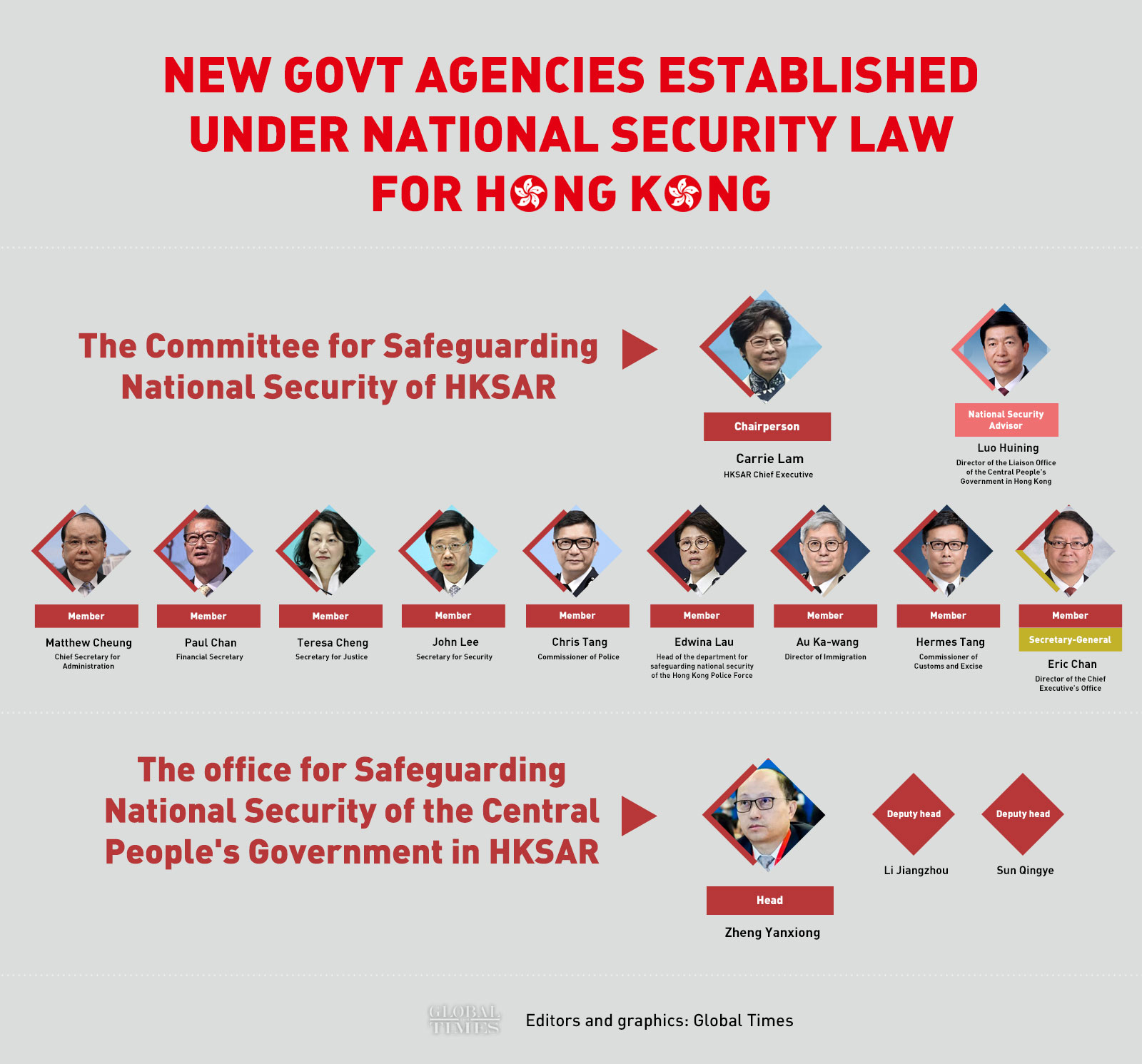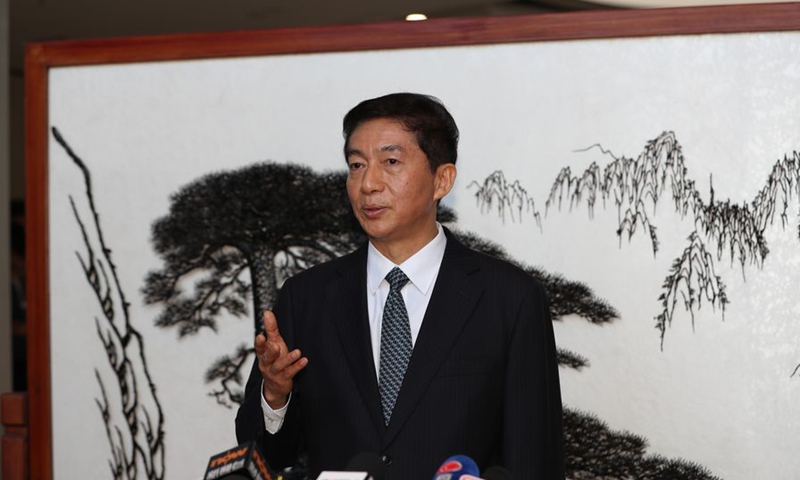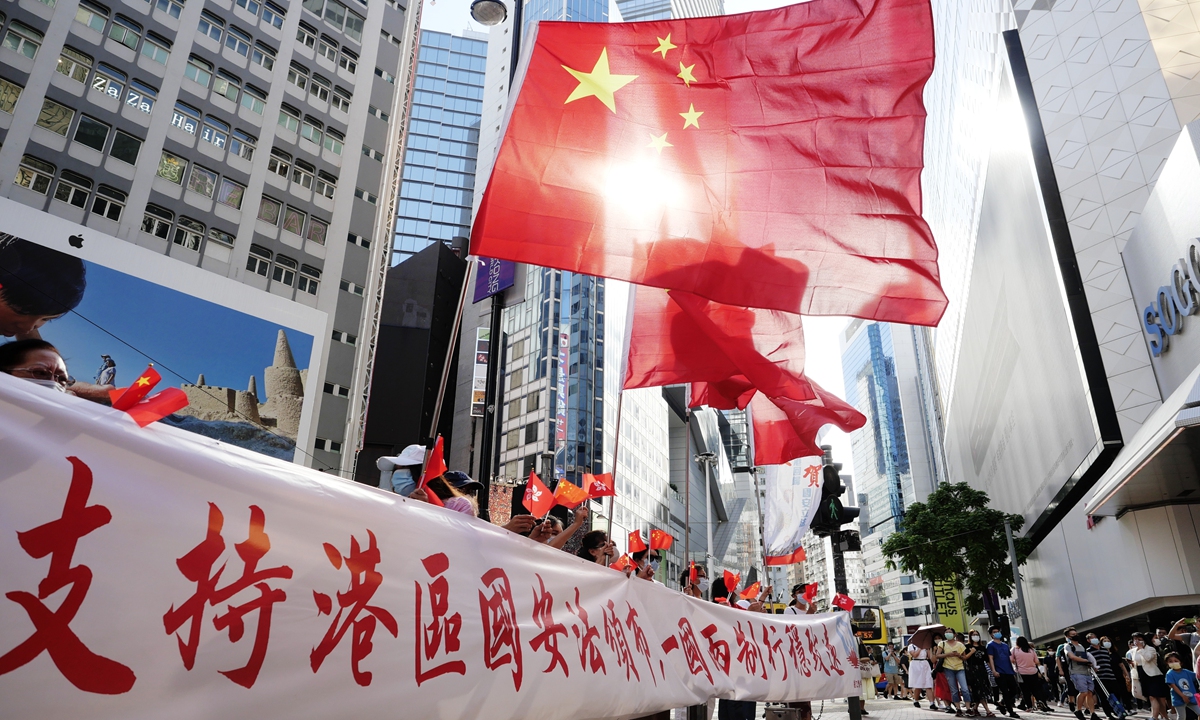China activates security deputies
By GT staff reporters Source:Global Times Published: 2020/7/3 22:44:19
Appointment of Luo shows strengthened role of central govt agencies in HK: senior advisor

After the Chinese central government unveiled a series of appointments on Friday for two government bodies to safeguard national security in Hong Kong - a major step in finalizing the law enforcement mechanism under the newly enacted national security law - the role of the central government's liaison office in the Hong Kong Special Administrative Region (HKSAR) has been further boosted, which shows that the central government bears the fundamental responsibility for national security matters in the city.
The top authority announced the appointment of Luo Huining - director of the central government's liaison office in the HKSAR and deputy director of the Hong Kong and Macao Affairs Office of the State Council - as the national security advisor to the newly established HKSAR committee for safeguarding national security. Luo is expected to provide guidance on national security matters and serve as a key bridge in coordination work between central and regional authorities, according to observers.
Luo now holds three positions, which shows that he represents the central government position directly in the HKSAR national security committee, Lau Siu-kai, vice president of the Chinese Association of Hong Kong and Macao Studies, told the Global Times on Friday.
"It means Luo could exert influence on supervision, guidance and assistance in national security affairs, and also effectively promote contact and coordination between the central government and HKSAR government to maintain national security," Lau said.
During the Fourth Plenary Session of the 19th Communist Party of China (CPC) Central Committee in October 2019, the central committee decided to deal with Hong Kong's deep-seated political issues and reduce the space for hostile forces from home and abroad, said the senior advisor to the central government's Hong Kong policies.
"Therefore, naming the director of the liaison office as the national security advisor to the committee also means that when implementing the new policy in Hong Kong, the central government's leading role will be further demonstrated through the work of the liaison office, meaning that the actual influence of the liaison office may be further boosted," he pointed out.
Also on Friday, Zheng Yanxiong, a member of the Standing Committee of the Communist Party of China Guangdong Provincial Committee, was appointed by the central government to lead the office for safeguarding national security of the central government in the HKSAR, finalizing law-enforcement mechanisms.
The office for safeguarding national security of the central government would fulfill the central government's ultimate responsibility on national security matters in the city, which will operate with a high authority and work with existing central government institutions.
Also on Friday, the HKSAR government announced the official establishment of the committee in accordance with Article 15 of the national security law for Hong Kong passed on Tuesday.
Two departments under the Hong Kong Police Force (HKPF) and Department of Justice have also been set up to advance enforcement of the new law. The HKPF's department for safeguarding national security, led by deputy commissioner of the police Edwina Lau, and a specialized prosecution division responsible for the prosecution of national security offenses under the Department of Justice, would handle national security cases in Hong Kong.
After the appointments, the law enforcement mechanism has been finalized, which will be followed by further work, including improving the integration of the national security law and local law in Hong Kong, effectively implementing the national law and integrating it into the local legislative system, and coming up with more details of law enforcement guidance, local lawmakers, officials and legal experts said.

Luo Huining Photo: Xinhua
Stronger central authority representation
As former Party chief of Northwest China's Qinghai Province and North China's Shanxi Province, Luo's past experience shows he is politically mature and has a tacit understanding of the central government, according to some observers.
Appointing the head of the central government's liaison office as national security advisor to Hong Kong also shows the continuity in reshuffling Hong Kong-related officials, which could avoid the decentralization of the central authority's power in the region, Li Xiaobing, an expert on Hong Kong, Macao and Taiwan, from Nankai University, told the Global Times on Friday.
The director of the liaison office better understands the central government's political judgment on Hong Kong issues, and is also familiar with local affairs, Li said, noting that this knowledge would help the official strike a balance between central and local governance. "Luo is also familiar with the Hong Kong situation, which makes him a suitable candidate for this position," he added.
Under the national security law for Hong Kong, the Committee for Safeguarding National Security of the HKSAR, chaired by the city's chief executive, is responsible for affairs related to safeguarding national security in the city.
The central government-designated national security advisor to the committee will advise on matters related to the committee's duties and functions.
The liaison office has been under tremendous pressure since the start of anti-government protests in 2019 due to its limited role and functions on Hong Kong matters other than the unification of pro-establishment forces and patriotic groups, some observers said. Some Western media have also been saying it has misjudged the situation in Hong Kong, isolating itself from the majority of Hong Kong society. Assuming office in January, Luo is expected to bring the central government's governance in Hong Kong into a new era.
"Such an arrangement for officials will enable the liaison office to have an effect in national security matters in Hong Kong," Tian Feilong, a Hong Kong affairs and legal expert at Beihang University in Beijing, told the Global Times on Friday.
For example, if the committee is uncertain about a particular national security matter, it could consult the national security advisor, who would report the situation to the central government's national security office in Hong Kong, Tian said.
Though Luo would hold different positions, it does not mean the positions completely overlap. Instead, they would be different, Tang Fei, a member of the Chinese Association of Hong Kong and Macao Studies, told the Global Times.
"The liaison office work is open to society, highlighting the unification. It is not confidential," he said, noting that if those two are confused with each other, it won't be helpful for uniting the different spheres of Hong Kong.

A group of Hong Kong residents celebrate the passage of the national security law for Hong Kong and mark the 23rd anniversary of Hong Kong returning to China in Causeway Bay on Tuesday. Photo: Xinhua
Professionalism under spotlight
The central government's office for safeguarding national security in Hong Kong has the ultimate judicial power and will "have the final say" on national security-related cases, which will also have absolute law enforcement power in situations of urgency and necessity, legal experts said.
Zheng's rich experience in education, publicity and the social dispute sector is considered his major advantage, especially for his remarks during the Wukan village protests in Guangdong and his handling of social disputes, some observers said.
"He is experienced in dealing with social unrest and understands Cantonese, which would help coordinate Guangdong and Hong Kong," Tian said.
Li Jiangzhou, the director of the police liaison department of the liaison office of the central government in the HKSAR, and Sun Qingye were appointed on Friday as deputy heads of the new office. From the Ministry of Public Security, Li has been responsible for domestic security operations, specializing in collecting intelligence, while Sun is from the Ministry of State Security (MSS), according to several sources, with the rest of the official's history so far undisclosed.
The office led by a politically mature official, aided by two highly professional officials, forms a "very good balance" between public relations and the requirements of operations, Tian said.
It's widely believed that the newly established department of the HKPF would further enhance its intelligence collection capacity as the social unrest since 2019 has showed signs of a color revolution, with external forces supporting local secessionists and riots to instigate hatred and fuel rampage. Several sources close to the HKPF told the Global Times recently that they would expect closer work with central government's authorities in the HKSAR in helping improving the capacity and coordinating operations.
Appointing an official from Guangdong familiar with the situation in Hong Kong also shows that in safeguarding national security, the cooperation of Guangdong, Hong Kong and Macao would become priority, Lau noted.
"The two agencies will support each other, be in close communication, and take joint action when necessary. The committee will assist the office in the exercise of jurisdiction in certain cases," he said.
Posted in: SOCIETY,HK/MACAO/TAIWAN